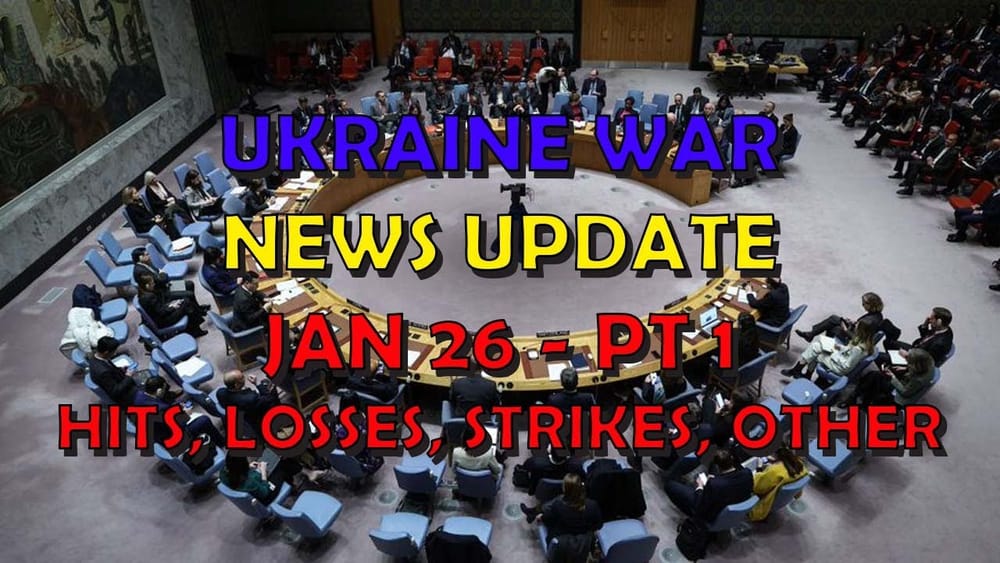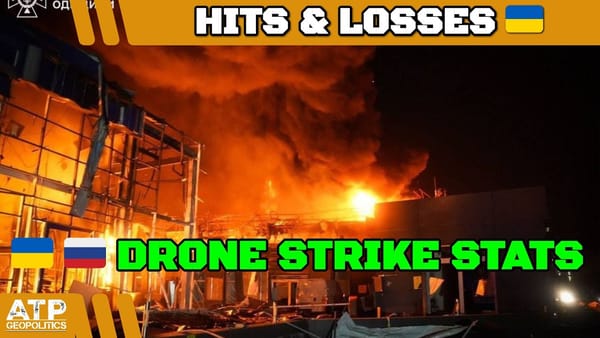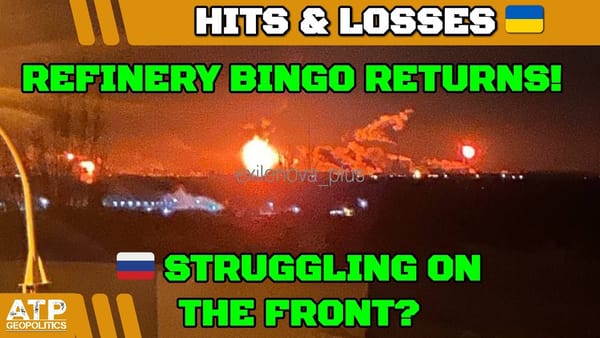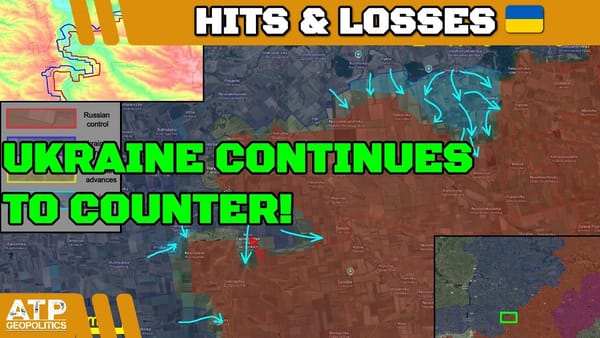Ukraine War Update NEWS: Pt 1 - Overnight & Other News
Table of Contents 📖
"It is absolutely disgusting that they'd have the gall to go to the UN Security Council, complain about this plane being shot down, which was a plane being used for military purposes, while at the same time having spent two years obliterating civilian infrastructure in Ukraine. It's disgusting."
Hello Team
🎦 00:00-00:14⏩
Jonathan welcomes viewers to a Ukraine War Update News video. This is the first part of the update for 26/01/2024.
Return to top⤴️
🪦 DISCLAIMER FOR GENERAL STAFF LOSSES DATA
- These are real people with real lives and real families who love them. Don’t let the numbers sap your humanity.
- These numbers probably aren’t accurate but they’re the best we have and we don’t need them to be accurate to be indicative of patterns of activity.
- All losses are estimates. Losses cannot be counted with accuracy because of the conditions on the ground.
- Both sides would see it to be of their advantage to minimize their own losses maximize the other side’s losses.
- Neither side releases their losses but we have enough transparency from the Ukrainian side to have confidence in they are indicative.
- Personnel losses are hard to count. If a soldier gets injured, heals up, and returns to the front line only to get injured again, is that one loss or two? Also, how to deal with losses from PMC’s or soldiers fighting with RF from occupied territories?
- Equipment losses are hard to count. If an AA complex involves several parts and one part gets disabled, is that a loss, or a fraction of a loss? If a tank gets disabled, repaired, back into the fight, then disabled again, is that one lost tank or two?
- All recorded losses are vulnerable to multiple reporting. We have already seen numerous cases of multiple drones in the air reporting the same loss from different angles as multiple engagements.
- Losses are not always reported on the same day they occurred. It is frequent that drone losses are reported at least 24 hours after other terrestrial equipment losses. Certain losses may not be reported for days or weeks for military intelligence reasons.
Russian Losses
🎦 00:14-04:46⏩
Jonathan discusses the Ukrainian General Staff figures, noting high Russian personnel losses of 990. He speculates that weather may have impacted the lower number of Russian artillery systems (15) lost, compared to previous days.
- Jonathan addresses the discrepancy between visually confirmed artillery losses and the higher figures reported by the Ukrainian General Staff. He explains that both Ukrainian and Russian forces classify 82mm mortars as artillery systems, which are numerous, close to the front lines, and often destroyed without leaving much traceable evidence. This explains the high reported losses but lack of visual confirmation. He references a comment by Robert Mills.
- Jonathan highlights Andrew Perpetua's analysis, indicating a loss ratio of five to one (Russian to Ukrainian). This favourable ratio for Ukraine is attributed to their active defence strategy, aiming to inflict maximum damage on advancing Russian forces.
- Acknowledging input from Andrew Perpetua, Jonathan clarifies that older tanks (like T-64s) can be upgraded and may be more valuable than newer models with inferior upgrades due to sanctions and supply chain issues. Jonathan cites the example of the Ukrainian T-64BM Bulat, upgraded from the aging T-64B, to illustrate this point.
Ukrainian Losses
🎦 04:46-05:06⏩
Ukrainian losses include electronic warfare equipment, a boat, an artillery piece, three T-64 tanks and other equipment.
Return to top⤴️
Russian Drone Operators Targeted: Ilovaisk Strike
🎦 05:06-15:12⏩
Jonathan discusses the recent targeting of Russian FPV drone operators in Ilovaisk, following a similar incident where Ukrainian forces eliminated a high-value Russian drone operator named Moses near Krinki.
- In Ilovaisk, a Ukrainian HIMARS strike targeted a Russian drone operator training facility, reportedly killing 24 and injuring 4. This is a significant loss for Russia, as FPV drone operators are highly skilled and play a crucial role in their military operations.
- The strike was made possible by a security breach within the Russian drone operator group, "Pseudo-Platov". The group's commander, "Pseudo-Platov" (real name redacted), shared the training location coordinates via a Telegram bot, which Ukrainian intelligence intercepted. Jonathan reads out a statement from Pseudo-Platov, expressing grief over the loss of their comrades and vowing revenge.
- Jonathan notes the availability of video footage of the strike, highlighting the increasing use of reconnaissance drones by both sides to monitor activities deep behind enemy lines. He speculates on the types of drones used for long-range reconnaissance, mentioning the Bayraktar TB2.
- Jonathan expresses satisfaction at the elimination of these Russian drone operators, sharing Andrew Perpetua's sentiment of "pure joy". He condemns the hypocrisy of the Russian Federation complaining about Ukrainian attacks whilst indiscriminately attacking civilian targets in Ukraine.
Ukrainian Special Forces Operation in Kherson
🎦 15:12-15:42⏩
Jonathan mentions a video of a Ukrainian special forces operation where Ukrainian forces cross the Dnipro River at night to destroy a Russian observation point in Kherson. Jonathan highlights that both sides are experiencing losses, particularly boats and personnel, in attempts to control the Dnipro River.
Return to top⤴️
Ukrainian UGV Destroys Bridge
🎦 15:42-17:36⏩
Jonathan excitedly describes a video showcasing a Ukrainian unmanned ground vehicle (UGV) carrying explosives. The UGV travels 4km to a targetted bridge, successfully destroying it. Jonathan marvels at the innovative use of technology and its implications for future warfare.
Return to top⤴️
Nepal Demands Return of Citizens Recruited by Russia
🎦 17:36-18:12⏩
Nepal has demanded Russia return its citizens recruited to fight for Russia in Ukraine. They are demanding the return of approximately 200 citizens, compensation for the dead and the return of the bodies of 12 Nepalese fighters. 5 Nepalese citizens are currently prisoners of war.
Return to top⤴️
Distance Strikes: Kharkiv & Kherson
🎦 18:12-22:15⏩
Jonathan notes the decreased intensity of Russian missile attacks, highlighting a reduction from weekly barrages exceeding 100 missiles to less frequent attacks with around 40 missiles. He cites Michael Weiss's interview with Estonian intelligence officer, Carl, as the source of this information.
- Jonathan reiterates the significance of the reduced missile attacks, emphasizing that Russia would launch larger attacks if they possessed the resources, supporting the theory of dwindling missile stockpiles.
- Jonathan condemns Russia's continued use of S-300 surface-to-air missiles in a ground attack role, targeting civilian infrastructure in Kharkiv and Kherson. He expresses outrage over the attacks on residential buildings, kindergartens, and shopping centres.
- Despite these attacks on civilians, Russia filed a complaint with the UN Security Council regarding the downing of an Il-76 military transport plane.
Russia's UN Security Council Complaint: IL-76 Downing
🎦 22:15-28:00⏩
Jonathan criticizes Russia's audacity in complaining to the UN Security Council about the downing of their IL-76 military transport plane, while simultaneously targeting Ukrainian civilians.
- Russia claims the IL-76 was carrying prisoners of war when it was shot down. However, Jonathan argues that if this was true, they would readily provide evidence. The lack of evidence suggests otherwise.
- Jonathan highlights Russia's hypocrisy, quoting their statement at the UN Security Council accusing Ukraine of spreading "lies" about the incident.
- He dismisses Russia's claims as "disgusting," emphasizing their two-year campaign of destroying civilian infrastructure in Ukraine.
- Contradicting Russia's assertions, Andriy Yusov, a representative of Ukraine's military intelligence, revealed that only 5 bodies were delivered to the morgue in Belgorod. This information, obtained through intelligence sources, indicates the plane was likely carrying cargo, such as S-300 missiles, as Ukraine initially claimed.
- Andriy Yusov further stated that a planned prisoner exchange on 24/01, which would have been the largest since the war began, was disrupted due to the IL-76 incident.
- Addressing a list of individuals Russia claims were on board, Yusov labelled it a provocation intended to elicit a response from Ukraine. He points out that the list includes 17 people already exchanged.
- Jonathan expresses skepticism towards the authenticity of footage from the crash site, finding the limited evidence of blood (described as "bright pink") unconvincing.
- He questions the speed at which the crash site was cleaned and secured, preventing emergency services access and potentially obscuring evidence. He believes the available evidence points to the plane being a cargo plane, not carrying POWs.
Putin's "Signals" on Negotiation & Kremlin's Denial
🎦 28:00-29:37⏩
Jonathan discusses reports suggesting Putin might be open to negotiations with Ukraine.
- Citing Bloomberg, Jonathan reveals that Putin might be willing to drop demands for Ukrainian neutrality and for Ukraine to renounce NATO aspirations. However, he would insist on Russia retaining control over occupied territories, including Crimea.
- Despite initial reports, Kremlin spokesman Dmitry Peskov publicly denied Bloomberg's report, stating that Russia will not abandon its demands regarding Ukraine's NATO ambitions and neutral status. Jonathan questions whether Peskov's denial reflects the reality of behind-the-scenes discussions.
- He is doubtful that Ukraine would agree to concede any territory to Russia, particularly given the current stalemate on the front lines and potential delays in US aid packages. Jonathan believes Russia is using the current situation to their advantage, attempting to negotiate from a perceived position of strength.
Gazprom Plane Crash in Afghanistan Update
🎦 29:37-30:34⏩
Jonathan provides an update on the Gazprom plane crash that occurred in Afghanistan. It is now being reported that $1.2 million in cash was stolen from the wreckage.
Return to top⤴️
Infrastructure Problems & Political Instability in Russia
🎦 30:34-35:55⏩
- Jonathan highlights ongoing infrastructure issues in Russia, citing the resignation of Novosibirsk's mayor following heating and water problems. Tim White suggests that resigning ahead of an election year is a strategic move to avoid association with negative news.
- Jonathan notes another water pipeline burst in Biysk, resulting in power outages. He questions the official explanation of "planned outages," hinting at a potential cover-up.
- He connects these infrastructure failures to a UK intelligence report stating that heating breakdowns have occurred in 16 locations across Russia in recent months.
- Jonathan argues that these breakdowns, happening amidst freezing temperatures, exacerbate an existing problem plaguing Russian cities for decades. This has become more severe due to Russia prioritizing military spending over public infrastructure, especially following the 2022 invasion of Ukraine.
- The mobilization of troops has further strained regional budgets and likely led to cuts in maintenance spending, as local governments grapple with reduced federal revenue and the need to fund volunteer forces. The mobilization has also created workforce shortages, impacting the availability of qualified engineers and plumbers.
- Jonathan highlights the political significance of these infrastructure failures, stating that addressing them is crucial for Putin ahead of the upcoming Russian presidential elections.
- Transitioning to political analysis, Jonathan discusses an anti-war candidate gaining momentum in Russia, raising questions about the Kremlin's approach to managing dissent during the elections.
- He references a Daily Telegraph podcast, "Ukraine: The Latest," which featured James Milner discussing the challenges faced by this anti-war candidate.
- Jonathan speculates on the Kremlin's potential strategies, considering whether they will allow the candidate to run while manipulating the results using electronic voting machines, or if they will find ways to disqualify him altogether.
- He draws parallels with the recent disqualification of a female candidate based on alleged paperwork irregularities, highlighting the Kremlin's control over the electoral process.
- Jonathan concludes that Russia, as a dictatorship under Putin's control, faces a delicate balancing act between managing dissent and maintaining a facade of legitimacy.
- In a stark reminder of Russia's repressive tactics, Jonathan mentions the imprisonment of Igor Girkin (aka "Strelkov"). Girkin, a Russian nationalist and former military leader, was sentenced to 4 years in prison for "extremism" after criticizing the Kremlin's handling of the war in Ukraine. He highlights the irony of Girkin, a known war criminal implicated in the downing of MH17, being imprisoned for "extremism" simply for expressing dissent against Putin's regime. Jonathan concludes by emphasizing that Girkin's imprisonment exemplifies the true nature of "liberty" in Russia.
Wrap up
🎦 35:55-36:02⏩
Jonathan signs off, reminding people to like, subscribe and share the video. He's off for a well-deserved cup of tea before recording part 2.
Return to top⤴️




